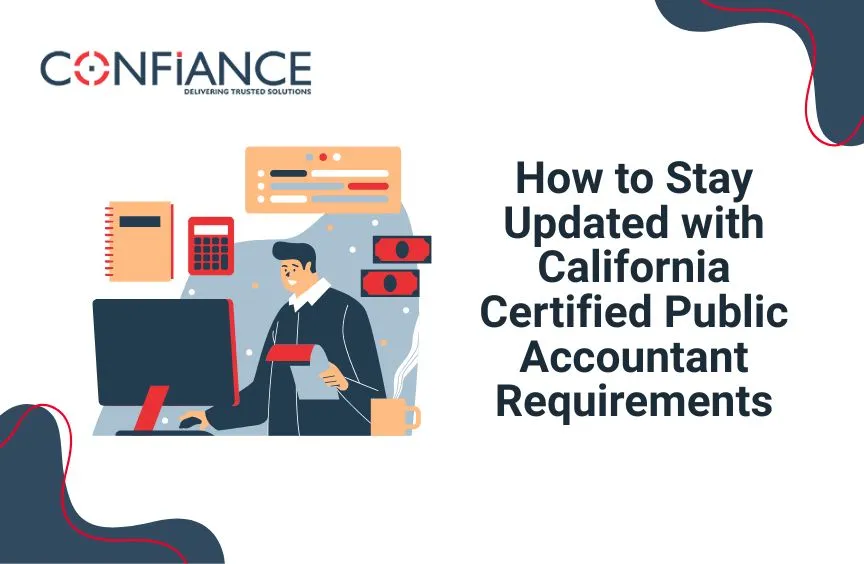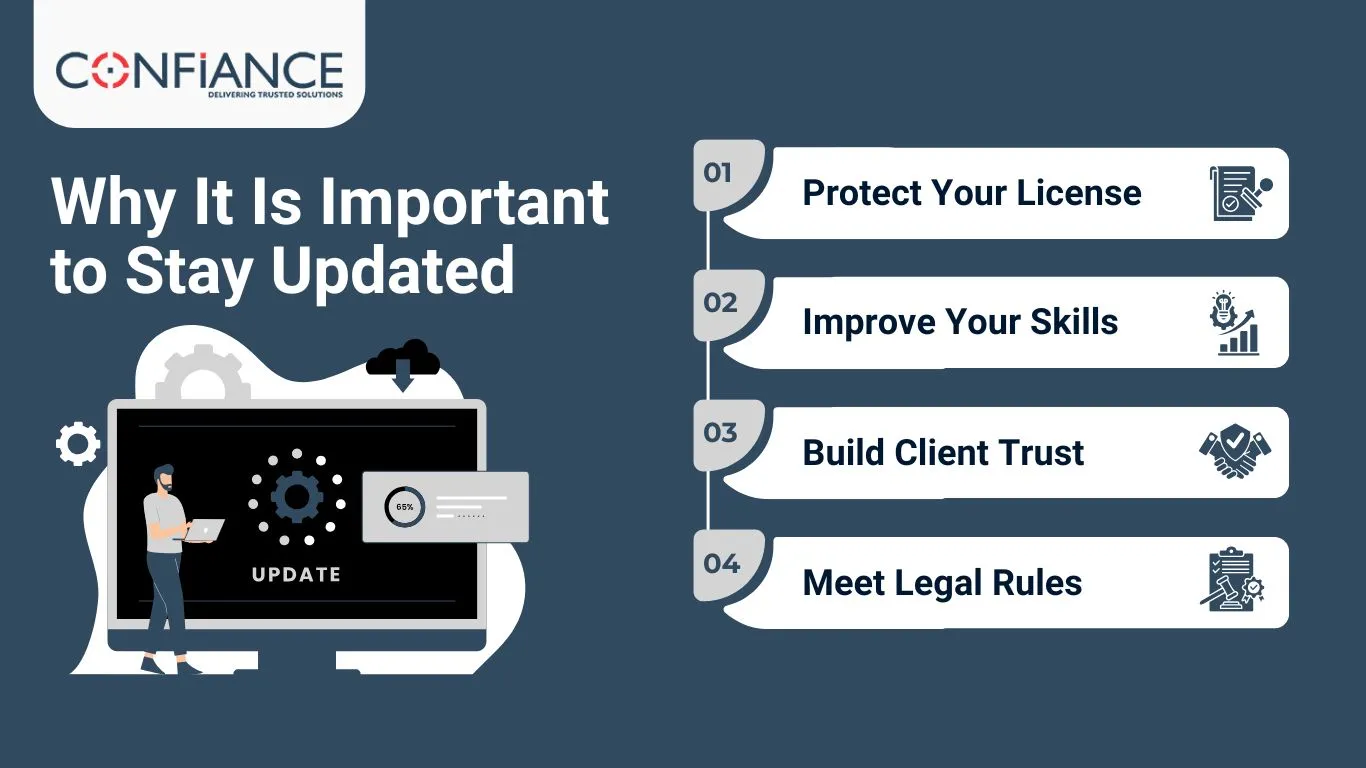
How to Stay Updated with California Certified Public Accountant Requirements
If you want to work as a CPA in California, following the California Certified Public Accountant Requirements is very important. These rules help you to remain compliant, work ethically, and stay skilled in accounting. Whether you are a new CPA or have years of experience, staying up-to-date with these rules is key to success.
In this guide, we will provide simple ways to stay informed and comply with all California CPA rules.
What are the Certified Public Accountant Requirements in California?
The Certified Public Accountant Requirements set the standards for CPAs in California must follow. These rules are made by the California Board of Accountancy (CBA). They cover licensing, work experience, education, ethics, and ongoing learning.
1. Licensing Rules
To get a CPA license in California, you must:
- Complete at least 150 college units.
- Get a bachelor’s or higher degree from a recognized school.
- Pass the Uniform CPA Exam.
- Work under a licensed CPA for the required period.
- Submit your application and pay the fees.
These steps form the first stage of meeting Certified Public Accountant requirements, guiding the path to becoming licensed in California. Missing any part may prevent approval of your license.
2. Continuing Education
California CPAs must take continuing education (CPE) to keep their license. The rules include:
- 80 hours of courses every two years.
- Include classes on ethics, tax, accounting, and audits.
- Keep proof of completed courses.
CPE helps CPAs stay aware of new rules and changes in the accounting world.
3. Ethical Rules
Ethics are a big part of CPA rules. CPAs must:
- Follow the AICPA Code of Ethics.
- Avoid conflicts of interest.
- Report any legal or disciplinary issues to the CBA.
4. Renewal Rules
- The license must be renewed on time.
- Renewal needs CPE proof.
- Pay renewal fees before the deadline.
- Check your records with CBA.
- Renewal forms must be correct.
- Missing a renewal can suspend your license.
- Extra late fees may be added.
Ethics are often included in CPE courses, helping you meet Certified Public Accountant Requirements while staying professional in California.
Why It Is Important to Stay Updated
Staying updated is not only about avoiding fines. It also helps you grow as a CPA and keep clients’ trust.
Protect Your License
Missing deadlines or CPE hours can lead to fines or even losing your license. Staying updated keeps your license safe.
Improve Your Skills
Accounting rules change all the time. Staying informed helps you give the right advice and serve your clients well.

Build Client Trust
Clients rely on CPAs for accurate and ethical advice. Following the latest California CPA Requirements builds trust and long-term relationships.
Meet Legal Rules
Staying updated also means following state laws. These laws protect the public. The California Board of Accountancy (CBA) often checks its rules. Breaking them can bring fines or legal trouble. The rules guide fair work and lower risk. Keeping up helps you avoid problems and stay in good standing.
Tools to Stay Updated
A Certified Public Accountant can use various tools to meet California’s requirements and maintain compliance easily.
California Board of Accountancy Website
The CBA website gives:
- News on licensing changes.
- Deadlines for license renewal.
- Rules for CPE and ethics.
Check the site regularly to get correct information straight from the source.
Newsletters and Industry Publications
Sign up for newsletters from CPA groups or accounting magazines. They provide:
- Updates on tax laws.
- News about audits and accounting standards.
- Tips to follow the California CPA requirements.
Online CPE Courses
Online courses are a convenient way to meet CPE rules. They allow you to:
- Study anytime at your own pace.
- Track completed courses.
- Receive alerts for required classes.
Using online CPE helps CPAs stay compliant without stress.
CPA Associations and Events
Joining professional groups like CalCPA or AICPA helps you:
- Attend workshops and conferences.
- Get early news on rule changes.
Connect with other CPAs for support.
Social Media Updates
- Follow CBA on LinkedIn.
- Join CPA groups on Facebook.
- Twitter for quick alerts.
- YouTube for CPE webinars.
- Share knowledge in forums.
- Stay active in CPA chats.
- Social media makes news fast.
Webinars and Podcasts
- Live sessions on new laws.
- Podcasts by CPA experts.
- Q&A with compliance leaders.
- Recordings for later review.
- Guest speakers on ethics.
- The monthly update shows.
- Great for busy CPAs.
Best Practices for Compliance
Even with tools, using good habits makes it easier to follow CPA rules.
Keep a Compliance Calendar
Make a calendar for:
- License renewals.
- CPE deadlines.
Ethics course dates.
A calendar helps you stay organized and avoid missing deadlines.
Keep Records
Save proof of:
- Completed CPE hours.
- Certificates for ethics courses.
- Applications and letters from the CBA.
Records make license renewal easier and show that you follow California Certified Public Accountant Requirements.
Network with Other CPAs
Talk to other CPAs to share tips and updates. Join CPA groups or online forums to:
- Learn about local rules.
- Get advice from experienced CPAs.
- Stay ahead of changes in California CPA Requirements.
Review Rules Often
- Read updates on the CBA site.
- Review ethics guides.
- Check AICPA standards.
- Compare changes each year.
- Study audit updates.
- Keep notes for reference.
- Teach staff about rules.
Take Small Steps
- Split CPE into short parts.
- Learn a bit each month.
- Avoid last-minute stress.
- Track each course as done.
- Pick topics you enjoy.
- Stay steady with learning.
- Reward progress with breaks.
Common Challenges and How to Solve Them
Even experienced CPAs face problems staying updated. Knowing the challenges and solutions helps avoid issues.
Frequent Rule Changes
Accounting rules often change. To keep up:
- Sign up for CBA alerts.
- Set aside time each month to read updates.
- Attend webinars or workshops.
Completing CPE Hours
Some CPAs find it hard to finish 80 hours every two years. Try these tips:
- Split courses into small parts.
- Mix online and in-person courses.
- Record hours as you complete them.
Following Ethics Rules
Ethics rules can be tricky. To handle them:
- Take ethics courses regularly.
- Ask the CBA for help if needed.
- Discuss real-life situations with other CPAs.
Cost of Compliance
- Budget for CPE in advance.
- Use free webinars when possible.
- Join groups for discounts.
- Plan tax savings for courses.
- Pick affordable online options.
- Share resources in teams.
- Avoid late fee penalties.
Time Management
- Block time for study.
- Avoid overbooking your work.
- Learn in small daily sessions.
- Use weekends wisely.
- Delegate small tasks.
- Stay consistent with the schedule.
- Mix learning with client work.
Future Trends in CPA Requirements
The accounting world is changing, and CPA requirements may also evolve. Some expected trends include:
More Tech in CPE
- Data skills will be key.
- AI topics may be added.
- Cybersecurity learning is needed.
- Tech rules will expand.
- Cloud systems are part of CPE.
- Digital audits may rise.
- More tech ethics focus.
Online Platforms Growth
- More online CPE providers.
- Faster mobile learning.
- Virtual classrooms grow.
- Remote testing tools expand.
- Self-paced learning is common.
- Recorded lessons are widely used.
- Less need for travel.
Stricter Ethics Rules
- More focus on honesty.
- Rules on client data.
- Stricter fraud checks.
- Tougher audit standards.
- Ethics tests may expand.
- New laws on fairness.
- More public transparency.
Global Standards Link
- More global tax training.
- Shared audit methods.
- Ethics rules go global.
- More cross-border cases.
- CPA skills are used worldwide.
- Training in global finance.
- Global exams may appear.
Staying ready for these changes helps you keep a strong professional record.
The California Certified Public Accountant Requirements involve strict rules on licensing, ethics, reporting, and ongoing education. Managing all this while serving clients can be a challenge. Confiance makes it easier by handling your bookkeeping, financial reporting, and back-office tasks with accuracy and care. We keep records updated, track deadlines, and prepare reports that meet compliance standards. This reduces the risk of fines, saves you time, and ensures you stay aligned with California CPA rules. With our support, you can focus on clients while staying confident about compliance.
FAQs
- How many CPE hours must a CPA complete in California?
Every CPA must finish 80 hours of Continuing Professional Education (CPE) every two years. At least four hours must be in ethics, and the rest may cover tax, audits, or accounting. - Can extra CPE hours be carried forward?
No. Extra hours cannot roll into the next reporting period. Each cycle must meet the 80-hour rule on its own. - Are online CPE courses valid in California?
Yes. Online courses are valid if offered by a provider approved by the California Board of Accountancy (CBA). - What happens if I miss my CPE deadline?
You could get fines, late fees, or lose your license. You must finish the missing hours to get back in good standing. - Who sets CPA rules in California?
The California Board of Accountancy (CBA) makes all CPA rules and handles license renewals. - Can I transfer my CPA license from another state?
Yes. You must meet California’s rules for education, ethics, and CPE. - What are common mistakes CPAs make with compliance?
The main mistakes are missed renewal dates, not completing CPE hours, and poor record-keeping. - How much do CPE courses usually cost?
Costs depend on the provider. Online bundles may be more affordable, while live sessions often cost more.
